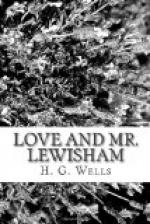Presently he was sitting in his slippers, with a cup of tea in his hand, and Ethel, kneeling on the hearthrug with the firelight on her face, was telling him of an answer that had come that afternoon to her advertisement in the Athenaeum.
“That’s good,” said Lewisham.
“It’s a novelist,” she said with the light of pride in her eyes, and handed him the letter. “Lucas Holderness, the author of ’The Furnace of Sin’ and other stories.”
“That’s first rate,” said Lewisham with just a touch of envy, and bent forward to read by the firelight.
The letter was from an address in Judd Street, Euston Road, written on good paper and in a fair round hand such as one might imagine a novelist using. “Dear Madam,” said the letter, “I propose to send you, by registered letter, the MS. of a three-volume novel. It is about 90,000 words—but you must count the exact number.”
“How I shall count I don’t know,” said Ethel.
“I’ll show you a way,” said Lewisham. “There’s no difficulty in that. You count the words on three or four pages, strike an average, and multiply.”
“But, of course, before doing so I must have a satisfactory guarantee that my confidence in putting my work in your hands will not be misplaced and that your execution is of the necessary high quality.”
“Oh!” said Lewisham; “that’s a bother.”
“Accordingly I must ask you for references.”
“That’s a downright nuisance,” said Lewisham. “I suppose that ass, Lagune ... But what’s this? ’Or, failing references, for a deposit ...’ That’s reasonable, I suppose.”
It was such a moderate deposit too—merely a guinea. Even had the doubt been stronger, the aspect of helpful hopeful little Ethel eager for work might well have thrust it aside. “Sending him a cheque will show him we have a banking account behind us,” said Lewisham,—his banking was still sufficiently recent for pride. “We will send him a cheque. That’ll settle him all right.”
That evening after the guinea cheque had been despatched, things were further brightened by the arrival of a letter of atrociously jellygraphed advices from Messrs. Danks and Wimborne. They all referred to resident vacancies for which Lewisham was manifestly unsuitable, nevertheless their arrival brought an encouraging assurance of things going on, of shifting and unstable places in the defences of the beleaguered world. Afterwards, with occasional endearments for Ethel, he set himself to a revision of his last year’s note-books, for now the botany was finished, the advanced zoological course—the last lap, as it were, for the Forbes medal—was beginning. She got her best hat from the next room to make certain changes in the arrangement of its trimmings. She sat in the little chair, while Lewisham, with documents spread before him, sat at the table.
Presently she looked up from an experimental arrangement of her cornflowers, and discovered Lewisham, no longer reading, but staring blankly at the middle of the table-cloth, with an extraordinary misery in his eyes. She forgot the cornflowers and stared at him.




